
Thanks to Mathew for corrections to this piece
Google has slapped down a big leathery gauntlet to the communications industry with the beta launch of its instant messaging service with voice-over-IP capabilities today.
Currently in beta, the Google Talk program will link its instant-messaging service to its e-mail service, Gmail, letting users contact each other over email, IM or a VoIP call.
 The program, Google Talk, is based on the open source Jabber protocol and competes directly with the three major providers of instant messaging – AOL, Microsoft and Yahoo.
The program, Google Talk, is based on the open source Jabber protocol and competes directly with the three major providers of instant messaging – AOL, Microsoft and Yahoo.
With the company trumpeting the service’s integration with GMail, Google Talk will use the same log-in information as their email account, with users able to access their inbox from within the Google Talk interface and send e-mails from there too.
Interestingly Google appears to refer to the accounts as a Google User Account – an interesting shift, pointing to the continued rise of additional Google services.
Users will be able to chat via IM and then talk to contacts on Google Talk by clicking on a “call” button in an open chat window or by clicking on the phone icon next to names on the contact list.
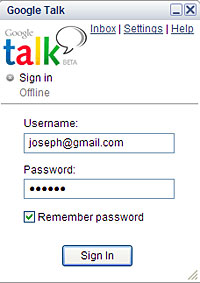 The software will let users have multiple voice sessions open at the same time, but only one can be active at any given time.
The software will let users have multiple voice sessions open at the same time, but only one can be active at any given time.
Gmail contacts will be loaded automatically into the Google Talk interface, letting users exchange instant messages with those who have downloaded the IM software.
Jabber is an open standard messaging protocol called eXtensible Message and Presence Protocol, or XMPP, and Google have stated that the company hoped to use the standard to interconnect the messaging industry. Many feel XMPP have advantages over SIP (Session Initiation Protocol, commonly used for VoIP) for voice communications.
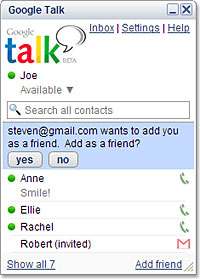 Currently, the three major messaging services are closed shops that generally don’t permit users to send messages to and from competing services – a source of continuing frustration for many IM users.
Currently, the three major messaging services are closed shops that generally don’t permit users to send messages to and from competing services – a source of continuing frustration for many IM users.
Jabber have been reported as preparing to interconnect with AOL, whose AOL Instant Messenger system is the largest provider of messaging.
“We are going to start working to federate all the other networks,” said Georges Harik, a Google director of product management who is responsible for Google Talk and several other services.
According to figures from comScore Media Metrix, more than 80 million Americans chattered on instant-messaging services in July, with 30.9 million using AIM, 23.3 million chatting on MSN Messenger and 23.2 million connecting via Yahoo Insider.
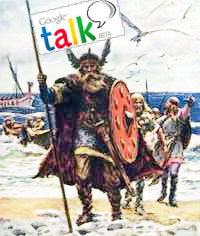 Peter Saint-Andre, executive director of the Jabber Software Foundation, estimated that 13.5 million use the Jabber standard, based on figures from Osterman Research.
Peter Saint-Andre, executive director of the Jabber Software Foundation, estimated that 13.5 million use the Jabber standard, based on figures from Osterman Research.
The company is yet to announce how the new service may earn its keep, but Google has stated that it intends to look for revenue opportunities in the future.
Google Talk reveals the company’s continuing ambitions provide to extend beyond Web searching, with some analysts predicting that Google will soon be taking on voice-over-Internet phone services like Vonage and Skype as well as the communication industry big boys.
How the industry reacts to this onslaught should be entertaining.
 Many who used the original of Google Desktop Search loved it. If you had a mention of the word you’d searched for, whether it be in a word document, an email or even in a IM session, up would come the list of mentions.
Many who used the original of Google Desktop Search loved it. If you had a mention of the word you’d searched for, whether it be in a word document, an email or even in a IM session, up would come the list of mentions. Last week a lot of fuss was generated in the blogging world when Microsoft decided to refer to RSS as Web Feeds in their upcoming updated browser, Internet Explorer 7 Beta 1. It will be interesting to see if equal vitriol will be reserved for Google as they ‘rename’ RSS to Web Clips.
Last week a lot of fuss was generated in the blogging world when Microsoft decided to refer to RSS as Web Feeds in their upcoming updated browser, Internet Explorer 7 Beta 1. It will be interesting to see if equal vitriol will be reserved for Google as they ‘rename’ RSS to Web Clips. After a brief look at it, we found that it appears to have rectified one of the problems with the old version – primarily that it slowed your machine down when it was loaded. This slow down often was so significant that it caused those with slower/older machines, or those who actually needed the power of their processors, to remove it – despite its benefits.
After a brief look at it, we found that it appears to have rectified one of the problems with the old version – primarily that it slowed your machine down when it was loaded. This slow down often was so significant that it caused those with slower/older machines, or those who actually needed the power of their processors, to remove it – despite its benefits. The big news late yesterday was that Google announced a second round share offer – on the first anniversary of their IPO.
The big news late yesterday was that Google announced a second round share offer – on the first anniversary of their IPO. Mary Meeker from Morgan Stanley clearly feels the same, “this cash balance could allow the company increased flexibility to consider large strategic acquisitions.”
Mary Meeker from Morgan Stanley clearly feels the same, “this cash balance could allow the company increased flexibility to consider large strategic acquisitions.” Microsoft has launched the first public beta of its Virtual Earth, an online mapping application overlaying satellite images with local searches and maps.
Microsoft has launched the first public beta of its Virtual Earth, an online mapping application overlaying satellite images with local searches and maps.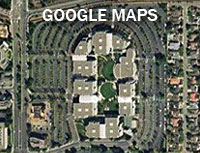 Virtual Earth will also have the capability to visually point out locations for ATMs, restaurants, and petrol stations – something that the rival Google Maps service has been able to do since incorporating satellite imagery in April this year.
Virtual Earth will also have the capability to visually point out locations for ATMs, restaurants, and petrol stations – something that the rival Google Maps service has been able to do since incorporating satellite imagery in April this year.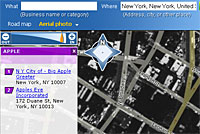 Mac users, however, will have to wait until autumn for a version that runs on their machines.
Mac users, however, will have to wait until autumn for a version that runs on their machines.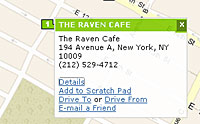 Wags on the Internet are claiming that Microsoft has virtually wiped Apple off the face of the Web, noting that Apple’s Silicon Valley headquarters – which can be seen in their full glory on Google Maps – appears as nothing more than a deserted parking lot in Virtual Earth.
Wags on the Internet are claiming that Microsoft has virtually wiped Apple off the face of the Web, noting that Apple’s Silicon Valley headquarters – which can be seen in their full glory on Google Maps – appears as nothing more than a deserted parking lot in Virtual Earth. Sony Whips Out A White PSP
Sony Whips Out A White PSP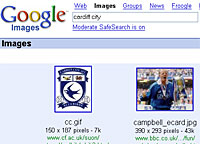 Google Grabs 47% Of All Searches Online
Google Grabs 47% Of All Searches Online Champagne corks were firing off at Google like a military salute as the Internet search engine kings revealed that their profits had jumped more than 300 per cent in the second quarter this year.
Champagne corks were firing off at Google like a military salute as the Internet search engine kings revealed that their profits had jumped more than 300 per cent in the second quarter this year. The company’s fortunes are currently on a stratospheric trajectory, with April’s first-quarter profit almost six times higher than a year earlier.
The company’s fortunes are currently on a stratospheric trajectory, with April’s first-quarter profit almost six times higher than a year earlier.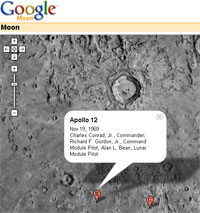 In honour of the first manned Moon Landing back in July 20, 1969, Google have launched an out of this world version of their Google Maps service – Google Moon.
In honour of the first manned Moon Landing back in July 20, 1969, Google have launched an out of this world version of their Google Maps service – Google Moon. Although you can use a sliding scale to zoom into the surface – just like the terrestrial version – and view landing sites, there are limitations to how close to the surface you can zoom because of insufficient NASA imagery.
Although you can use a sliding scale to zoom into the surface – just like the terrestrial version – and view landing sites, there are limitations to how close to the surface you can zoom because of insufficient NASA imagery. Glad you asked, and yes, the development of our Lunar hosting and research centre continues apace.
Glad you asked, and yes, the development of our Lunar hosting and research centre continues apace. Google are also advertising jobs at their Google Copernicus Hosting Environment and Experiment in Search Engineering (G.C.H.E.E.S.E.), offering “high-density high-delivery hosting (HiDeHiDeHo) and de-oxygenated cubicle dwelling.”
Google are also advertising jobs at their Google Copernicus Hosting Environment and Experiment in Search Engineering (G.C.H.E.E.S.E.), offering “high-density high-delivery hosting (HiDeHiDeHo) and de-oxygenated cubicle dwelling.” Google has launched an updated beta version of its personalised search tool that learns from your history of searches and search results you’ve clicked on, shuffling more relevant results to the top of the page.
Google has launched an updated beta version of its personalised search tool that learns from your history of searches and search results you’ve clicked on, shuffling more relevant results to the top of the page. Clearly, there could be a shedload of potential privacy concerns here with the search history feature compiling a detailed list of every page you’ve ever searched for, but sneaky surfers hoping for a bit of discrete titillation can sign out of the personalised search service, pause it or remove it through their accounts page.
Clearly, there could be a shedload of potential privacy concerns here with the search history feature compiling a detailed list of every page you’ve ever searched for, but sneaky surfers hoping for a bit of discrete titillation can sign out of the personalised search service, pause it or remove it through their accounts page. It’s not yet confirmed, but it appears that Google is preparing to challenge PayPal with its own online electronic payment system, rumoured to be called ‘Google Wallet’.
It’s not yet confirmed, but it appears that Google is preparing to challenge PayPal with its own online electronic payment system, rumoured to be called ‘Google Wallet’. Sellers who run auctions on eBay are major buyers of Google’s ads, which appear alongside search results, so it’s not surprising to see the company angling in for a slice of the payment action.
Sellers who run auctions on eBay are major buyers of Google’s ads, which appear alongside search results, so it’s not surprising to see the company angling in for a slice of the payment action. It was a bad weekend for Google as the entire site was rendered unavailable on Saturday night and their new Web Accelerator application drew criticism on privacy and security concerns.
It was a bad weekend for Google as the entire site was rendered unavailable on Saturday night and their new Web Accelerator application drew criticism on privacy and security concerns. Deeply unchuffed, Fried complained that “Google’s Web accelerator can wreak havoc on Web-apps and other things with admin-links built into the UI.”
Deeply unchuffed, Fried complained that “Google’s Web accelerator can wreak havoc on Web-apps and other things with admin-links built into the UI.” Sadly, things went from bad to worse on Saturday night when the world’s leading Internet search engine shut down from 6:45 to 7 p.m. eastern time, with some users experiencing longer outages.
Sadly, things went from bad to worse on Saturday night when the world’s leading Internet search engine shut down from 6:45 to 7 p.m. eastern time, with some users experiencing longer outages.